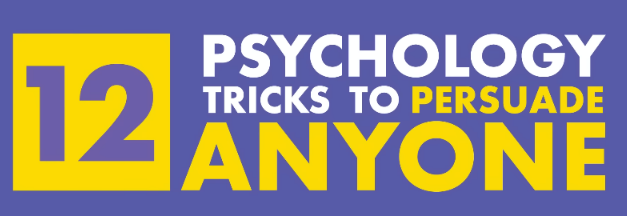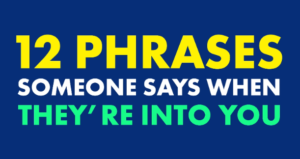We will learn twelve psychology tricks to persuade anyone.
Why do we do the things that we do?
While it’s always you who makes the final call, there are countless subtle stimuli influencing every thought and every impulse that crosses your mind. Even your ideas, goals, and dreams are seldom your own. It’s more likely those ideas came from someone or somewhere else. Think, for example, about billboards on the side of the road.
As you’re driving down the highway, you see colorful advertisements for tourist attractions, restaurants, and new businesses. At that moment, you’re unlikely to be influenced by those advertisements, but a few days later, a thought might pop into your head. Suddenly, you have the urge to ride a rollercoaster or treat yourself to a nice dinner.
These feel like your ideas, but in actuality, you’re being subtly persuaded into giving certain companies your business. For some people, this can be an unsettling realization. However, our objective here isn’t to criticize advertisements or marketing campaigns but to demonstrate how subtle psychological tricks can have a huge impact on real-life decisions.
The goal of a good advertisement isn’t to tell you what you want or need. Instead, they lead to what seems like your own conclusion. In the same way, a great salesman does not argue to change your mind or push their agenda. They nudge you toward something you already want, and that gives them significantly more persuasive power.
With the right tricks and tactics, you can have a similar effect on the people in your life. You can identify what people want, lead them to their own conclusions, and most importantly, nudge them toward an outcome that benefits you both. With these twelve psychological tricks and a little bit of charisma, you can persuade almost anyone to think and act in your favor.
1. Gifts create debts.
Giving a small gift is an easy way to persuade anyone, even a stranger, to open their mind. Any little present creates a feeling of debt in the people who receive it.
Friends, coworkers, and even strangers are more likely to listen to and agree with you when they feel indebted to you in some small way. After accepting and enjoying your presents, people feel guilty for not giving you an honest chance. When you’re trying to be more persuasive, one chance is often all you need.
2. The Force of Popularity
If you want someone to do something risky or unfamiliar, make yourself more persuasive by normalizing their behavior. Say something like, “Thousands of people do this every day,” and the other person won’t feel as scared to take the same risk.
If that doesn’t work, you can also use exclusivity to create a similar kind of social leverage. For example, if you want someone to buy an expensive item, you can make that object more appealing by emphasizing its rarity. The more precious something becomes, the less likely we are to share it with the people around us.
3. Ask for a Mile
Let’s say you need a small favor from someone. Instead of asking directly for what you want, start by asking for something much more complex and time-consuming.
If they say no, ask them for something smaller and more accessible. There is a good chance they’ll say yes to your second offer simply because it sounds more reasonable than the first.
4. Expose the real
Flaws Here’s a psychologically persuasive trick that most people never think to try: If you want to make an experience seem more appealing, you usually highlight its best qualities. You talk at length about how it’s unforgettable and awe-inspiring while neglecting to mention any flaws or downsides.
People become suspicious when something has too many pros and not enough cons. So, if you want to be more persuasive, acknowledge a few of those flaws. As long as the advantages outweigh the disadvantages, the other person won’t feel like they’re being cheated.
5. Statements of Logic
The reason people ignore or disagree with you may have nothing to do with your actual argument. You might have good ideas with the truth on your side, but people still don’t give you the credit you deserve. Why? Because they may understand what it is you are trying to say.
If you’re aiming to be persuasive, lead with a clear statement of logic. Define in simple terms what you want and why you think it is important.
Don’t overcrowd your argument with different tangents and unnecessary data. Instead, present the information as clearly as possible. You’ll be surprised at how persuasive you become when people know what you’re saying and why it matters.
6. Reactionary Terms
If you are trying to discourage someone from making a bad decision, try using strong, reactionary words like “danger,” “risk,” or “hazardous. These words evoke images of negative ideas, ultimately discouraging people from taking action.
What if, instead of downplaying something, you wanted to make it sound more appealing? The same technique can generate positive enthusiasm by using words like “reliable,” “advanced,” or “high-tech. It’s a small change, but even a single word can change someone’s mind.
7. The Power of Touch
The most persuasive people use a variety of tricks, including verbal, spatial, and even physical powers of persuasion. I’m not talking about intimidating the people you meet. I’m talking about calculated physical contact, used to establish trust and create an instant connection. For example, a strategic touch on the shoulder makes people feel like you are on their side.
Suddenly, you seem more like a friend than a stranger, giving you significantly more persuasive power. It’s important to remember, however, that people have boundaries, and your physical contact should never violate those boundaries.
As long as you are respectful and mindful of how physical contact affects different people, you can use this powerful trick to consistently make a strong impression.
8. Collective Language:
Sometimes, a simple change in pronouns can make or break an argument or a sale. If you want to be more persuasive, stop referring to other people as “you” and start referring to you both as “we” or “us. When facing a problem, people want to know that they are not facing it alone.
By changing your pronouns from singular to plural, you are creating an implied support system. You provide a much-needed sense of camaraderie, which persuades other people to have faith in the things you say.
By using collective language, every decision becomes a collaborative effort. In other words, if you stop singling people out, they’ll be more likely to listen and follow your lead.
9. Emotional Activation
Many people place too much emphasis on facts and data. While your information should be correct and well-researched, it’s equally important to present it in a way people enjoy and understand. When you apply too much data, some people may logically understand your point, but most won’t listen to a word you say. Why? Because you’re not giving them any reason to care.
To be more persuasive to almost anyone, you need to present your ideas in a way that activates real human emotions. Stop rattling off numbers and start telling stories. Make your ideas personal, relatable, and compelling.
Present them in a way that lights a fire under people and stimulates a genuine emotional reaction. For the vast majority of people, strong emotions govern every one of their thoughts and actions. Tell them a good story, and your argument is as good as gold.
10. Memorable Repetition
If you want to communicate a memorable idea, you have to say it twice. People are not always the best listeners, especially when they don’t know what they’re listening for. So, get in the habit of making your points more than once. There are a few reasons why repetition works as a reliable method of persuasion.
Typically, your brain uses repetition to define what is essential and what isn’t. If your brain hears something more than once, it assumes that the idea carries more value. Repeated ideas are also a whole lot more memorable. Your brain is more likely to store ideas that are repeated two or more times.
Each repetition solidifies ideas within your memory, making you more likely to recall that information when it counts. So, repeat yourself as often as you need to get your point across. Don’t be afraid of saying the same thing multiple times. Because the truth is, most people need to be reminded more than once.
11. Face-to-face
There are many different ways to communicate with someone. You can call, text, or use any number of social media platforms to engage in a conversation. But the most persuasive method of contact will always be face-to-face. Talking over text or phone instantly strips you of your persuasive power.
You can’t use your body language to emphasize important ideas. You can’t make physical contact to build trust and establish a stronger connection. The simple truth is that face-to-face conversations give you the best odds of making your point, so don’t settle for anything less.
12. Moral Incentives
People want to feel like they’re doing something good. So, if you want to be more persuasive, give them a reason to feel good about themselves. How? By creating a moral incentive.
In other words, tell this person that their decision not only helps you but also everyone in their community. Make them feel like a good person for choosing your side, and they almost always will.





















